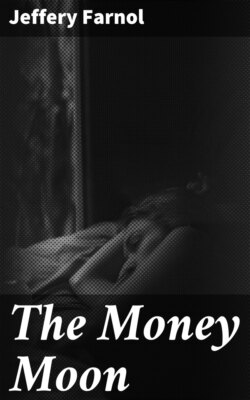Читать книгу The Money Moon - Jeffery Farnol - Страница 10
На сайте Литреса книга снята с продажи.
CHAPTER VII
ОглавлениеTable of Contents
Which concerns itself among other matters, with "the Old Adam"
Bellew awakened early next morning, which was an unusual thing for Bellew to do under ordinary circumstances since he was one who held with that poet who has written, somewhere or other, something to the following effect:
"God bless the man who first discovered sleep. But damn the man with curses loud, and deep, who first invented—early rising."
Nevertheless, Bellew, (as has been said), awoke early next morning, to find the sun pouring in at his window, and making a glory all about him. But it was not this that had roused him, he thought as he lay blinking drowsily—nor the black-bird piping so wonderfully in the apple-tree outside—a very inquisitive apple-tree that had writhed, and contorted itself most un-naturally in its efforts to peep in at the window;—therefore Bellew fell to wondering, sleepily enough, what it could have been. Presently it came again, the sound—a very peculiar sound the like of which Bellew had never heard before, which, as he listened, gradually evolved itself into a kind of monotonous chant, intoned by a voice deep, and harsh, yet withal, not unmusical. Now the words of the chant were these:
"When I am dead, diddle, diddle, as well may hap,
Bury me deep, diddle, diddle, under the tap,
Under the tap, diddle, diddle, I'll tell you why,
That I may drink, diddle, diddle, when I am dry."
Hereupon, Bellew rose, and crossing to the open casement leaned out into the golden freshness of the morning. Looking about he presently espied the singer—one who carried two pails suspended from a yoke upon his shoulders—a very square man; that is to say, square of shoulder, square of head, and square of jaw, being, in fact, none other than the Waggoner with whom he had fought, and ridden on the previous afternoon; seeing which, Bellew hailed him in cheery greeting. The man glanced up, and, breaking off his song in the middle of a note, stood gazing at Bellew, open-mouthed.
"What—be that you, sir?" he enquired, at last, and then—"Lord! an' what be you a doing of up theer?"
"Why, sleeping, of course," answered Bellew.
"W'ot—again!" exclaimed the Waggoner with a grin, "you do be for ever a-sleepin' I do believe!"
"Not when you're anywhere about!" laughed Bellew.
"Was it me as woke ye then?"
"Your singing did."
"My singin'! Lord love ye, an' well it might! My singin' would wake the dead—leastways so Prudence says, an' she's generally right—leastways, if she ain't, she's a uncommon good cook, an' that goes a long way wi' most of us. But I don't sing very often unless I be alone, or easy in my mind an' 'appy-'earted—which I ain't."
"No?" enquired Bellew.
"Not by no manner o' means, I ain't—contrariwise my 'eart be sore an' full o' gloom—which ain't to be wondered at, nohow."
"And yet you were singing."
"Aye, for sure I were singin', but then who could help singin' on such a mornin' as this be, an' wi' the black-bird a-piping away in the tree here. Oh! I were singin', I don't go for to deny it, but it's sore 'earted I be, an' filled wi' gloom sir, notwithstanding."
"You mean," said Bellew, becoming suddenly thoughtful, "that you are haunted by the Carking Spectre of the—er Might Have Been?"
"Lord bless you, no sir! This ain't no spectre, nor yet no skellington—which, arter all, is only old bones an' such—no this ain't nothin' of that sort, an' no more it ain't a thing as I can stand 'ere a maggin' about wi' a long day's work afore me, axing your pardon, sir." Saying which, the Waggoner nodded suddenly and strode off with his pails clanking cheerily.
Very soon Bellew was shaved, and dressed, and going down stairs he let himself out into the early sunshine, and strolled away towards the farm-yard where cocks crew, cows lowed, ducks quacked, turkeys and geese gobbled and hissed, and where the Waggoner moved to and fro among them all, like a presiding genius.
"I think," said Bellew, as he came up, "I think you must be the Adam I have heard of."
"That be my name, sir."
"Then Adam, fill your pipe," and Bellew extended his pouch, whereupon Adam thanked him, and fishing a small, short, black clay from his pocket, proceeded to fill, and light it.
"Yes sir," he nodded, inhaling the tobacco with much apparent enjoyment, "Adam I were baptized some thirty odd year ago, but I generally calls myself 'Old Adam,'"
"But you're not old, Adam."
"Why, it ain't on account o' my age, ye see sir—it be all because o' the Old Adam as is inside o' me. Lord love ye! I am nat'rally that full o' the 'Old Adam' as never was. An' 'e's alway a up an' taking of me at the shortest notice. Only t'other day he up an' took me because Job Jagway ('e works for Squire Cassilis, you'll understand sir) because Job Jagway sez as our wheat, (meanin' Miss Anthea's wheat, you'll understand sir) was mouldy; well, the 'Old Adam' up an' took me to that extent, sir, that they 'ad to carry Job Jagway home, arterwards. Which is all on account o' the Old Adam—me being the mildest chap you ever see, nat'rally—mild? ah! sucking doves wouldn't be nothin' to me for mildness."
